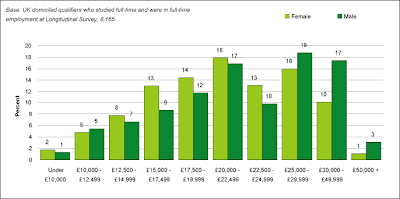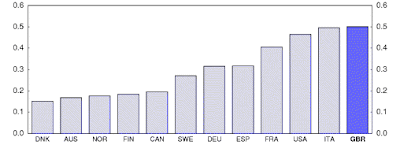
Comrades- we will build ten million more
Labour has spent billions of our cash on increasing the quantity of state education.
In 2006-07 it spent £74bn, more than double the £36.4bn spent ten years ago (a 60% increase in real terms). And that leaves out of account the much greater debts higher education students now incur on their own account.
Has it been worth it?
In 2006-07 it spent £74bn, more than double the £36.4bn spent ten years ago (a 60% increase in real terms). And that leaves out of account the much greater debts higher education students now incur on their own account.
Has it been worth it?
£11bn of the cash goes on higher education, where there are now 2.3m students, or 4% of the entire population (they include 27,000 doing our old favourite, the degree in media studies).
Now, we've just been given an update on employment patterns among recent graduates. And guess what. It turns out that many of these students don't get anything like traditional graduate salaries when they finally enter the labour market.
According to the ongoing study of 2002-03 graduates carried out by the Higher Education Statistics Agency (HESA), four years after graduation, 74% of first degree holders are still in jobs not classified as graduate occupations. And on top of that, only 74% are in full-time work of any description. Which implies that of the entire group, actually only a little over half are in graduate occupations (74% of 74%).
The impact on earnings is clear. The average first degree holder in full-time work is still only on £22,000, four years on. Which compares to average earnings across the economy as a whole - grads and non-grads - now around £24,000.
Here's the distribution of graduate incomes from the HESA study:
According to the ongoing study of 2002-03 graduates carried out by the Higher Education Statistics Agency (HESA), four years after graduation, 74% of first degree holders are still in jobs not classified as graduate occupations. And on top of that, only 74% are in full-time work of any description. Which implies that of the entire group, actually only a little over half are in graduate occupations (74% of 74%).
The impact on earnings is clear. The average first degree holder in full-time work is still only on £22,000, four years on. Which compares to average earnings across the economy as a whole - grads and non-grads - now around £24,000.
Here's the distribution of graduate incomes from the HESA study:

Yes, there are some high earning management consultants, lawyers, and investment bankers. But the bulk of these grads are still anchored in the low £20,000s or below. And remember, these are just those in full-time jobs: with a quarter of them still not in full-time work of any kind, there's a great long tail on incomes far below those shown in the chart.
Conclusion? The huge ramping up of student numbers has simply not paid off. Many of these new degrees have no economic value, and their holders are lumbered with debts they'd have avoided had they entered the labour market at 18 or earlier.
Labour of course is now intent on compounding the whole problem even further by forcing everybody to stay on at school (or "similar") until 18 - at pain of criminal law, including fines.
When we blogged this crackers idea here, we discovered the official estimate of costs was £200m for set-up, and £740m pa running costs. But we all know the true costs will be much higher.
The excellent Reform has put out a useful note on this. They point out that Labour's emphasis on the quantity of inputs rather than the quality of outputs has been an abject failure, and they quote the OECD's latest Economic Survey of the UK:
“While raising education participation is an important goal, it is not clear that compulsion is necessarily the best way to achieve it. In the United States there is substantial evidence that higher student achievement leads students to stay in school longer voluntarily.
For those students who have already performed poorly, and who are unmotivated, it is not clear what the returns to further education and training at ages 16 and 17 would be, particularly since the return on many existing vocational qualifications is low and the new diplomas are yet to be tested.
It should also be kept in mind that education participation is a relatively poor proxy for skills, and that a focus on qualifications can hide problems of poor usage and over-qualification."
The OECD also highlights a point already well known to regular BOM readers:
"There is no strong empirical link between aggregate education spending and pupil achievement so that additional resources do not automatically translate into better results."
Forcing disenchanted 16 year olds to remain in education is in nobody's interests, certainly not taxpayers. 16 is far too late to address educational failure: as Reform highlights, the real crying desperate need is to improve schooling for younger children.
PS As we know, social mobility in Britain has collapsed since the imposition of those one-size fits all comprehensive schools. And the OECD has an interesting chart showing how we're now pretty well at the top of the international social immobility league. "The chart shows the intergenerational earnings elasticities as estimated in various studies. The higher the parameter, the higher is the persistence of earnings across generations and thus the lower is mobility. Source: D’Addio, A.C. (2007), “Intergenerational Transmission of Disadvantage”, OECD Social, Employment and Migration Working Papers, No. 52."
 Some Old Labour types favour tackling this by abolishing private schools (see this blog). More sensible proposals envisage extending parental choice to the state sector, including voucher based schemes. One thing's for sure- in terms of social mobility, our current state education system is failing catastrophically.
Some Old Labour types favour tackling this by abolishing private schools (see this blog). More sensible proposals envisage extending parental choice to the state sector, including voucher based schemes. One thing's for sure- in terms of social mobility, our current state education system is failing catastrophically.